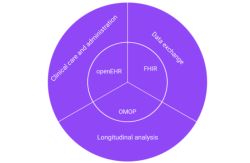A team of physician-researchers at Beth Israel Deaconess Medical Center (BIDMC) discovered that generative AI could serve as a promising tool for providing the correct diagnosis.
After testing one-well known publicly available chatbot’s ability to make accurate diagnosis, they discovered that Chat-GPT 4 could emulate the decision-making abilities of a medical professional. The chatbot correctly identified the top diagnosis nearly 40% of the time.
The progress in AI resulted in the development of generative AI models that demonstrate exceptional proficiency in providing detailed text-based responses that score highly in standardized medical examinations.
The objective of this investigation was to test whether the chatbot could solve complex diagnostic cases commonly used for education purposes.
To evaluate the chatbot’s diagnostic skills, the team used clinicopathological case conferences (CPCs), a series of complex patient cases including relevant clinical and laboratory data, imaging studies, and histopathological findings.
In the evaluation of 70 CPC cases, the artificial intelligence matched the final CPC diagnosis in 27 cases (39 percent). In 64 percent of the cases, the AI's differential diagnosis - a list of potential conditions based on the patient's symptoms, medical history, clinical findings, and laboratory or imaging results, included the ultimate CPC diagnosis.
Dr. Zahir Kanjee, MD, MPH, a hospitalist at BIDMC and assistant professor of medicine at Harvard Medical School, reinforced that while chatbots cannot replace the expertise and knowledge of trained medical professionals, generative AI holds promise as a complementary tool in the diagnostic process.
Dr. Kanjee states that it has the potential to assist physicians in comprehending complex medical data and refining their diagnostic thinking. However, further research is required to determine the optimal uses, benefits and limitations of this technology. Nevertheless, these findings hold promise for the future of diagnosis.
Source: JAMA
Image Source: iStock























